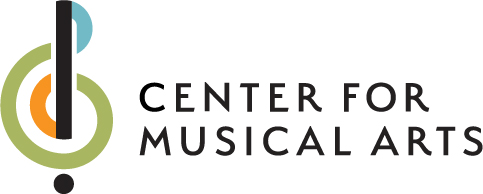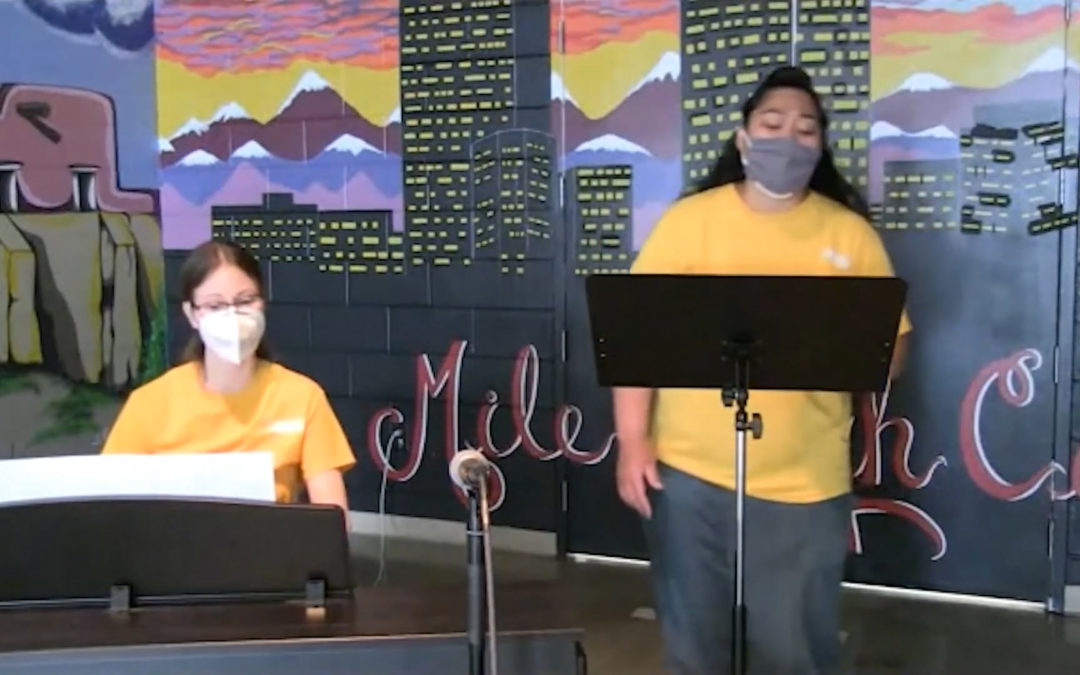(photo: Two Musical Freedom participants from the Denver Women’s Correctional Center)
In this Partner Highlight we are excited to introduce Jeanne Phipps, who runs Musical Freedom, a program which offers music lessons in Denver- and Golden-area prisons. Learn more about Jeanne’s great work below, as well as how you can support the Musical Freedom program.
Center for Musical Arts: Hello! My name is Erica Reid, I am the Marketing Manager for the Center for Musical Arts. A few weeks ago our Education Director, Kathy Kucsan, said, “You know who we really need to talk to? We need to talk to Jeanne Phipps who runs Musical Freedom.” How are you doing, Jeanne?
Jeanne Phipps: I’m doing great. How are you?
Center: I’m wonderful. I’m so excited to hear a little bit more about Musical Freedom. Can you give me the rundown?
Jeanne: So, I was involved in the women’s prison in another program when officials in the prison came to me and said, “We really want you to start a music program in here.” They said, “You’ll have to do a write-up on it and give it a name,” so I spoke with some of the women who were taking some lessons from me, and we came up with Musical Freedom. I’ve been in prison work now for about five years.
Center: Okay. So tell me a little bit about what happens in the program.
Jeanne: I’m there at the women’s prison two days a week for eight hours a day. I’m there at 7:00 AM until 3:15, and we give lessons, half-hour piano lessons, or lessons with the violin, the viola, and the cello. I also do vocals. Now, I’m not a vocal teacher, but I’ve sung in enough choirs under some very good directors, and I’m dealing with people who have never done this before, so we do the best we can.
Center: Yeah. Tell me how this idea came about. It sounds like you were already teaching music and decided to bring it into the prisons?
Jeanne: Yes. I was involved in a religious service and I was playing the piano for them. Some of the women asked if I could give them piano lessons, and that was the beginning of it.
Center: Oh my gosh. Can you tell me how the Center for Musical Arts is involved?
Jeanne: It became apparent that we needed to become a 501(c)(3) tax-exempt organization, and I did not want to start a brand new one. There are so many out there, and I didn’t want the administrative headaches that go along with that. I didn’t want to be connected with a specific church. I thought it was better to have a neutral organization. The Center for Musical Arts was perfect.
Center: Oh, wonderful. So, the Center does the administrative side of it, and you do the educational side?
Jeanne: That’s correct, yes.
Center: Oh, wow. You said that you’ve been in the prisons for about five years. Is that how long Musical Freedom has existed?
Jeanne: Musical Freedom, for about four or five years, yes. Somewhere in there, yeah.
Center: But you’ve been teaching… Tell me a little bit about your teaching background or your music background.
Jeanne: [laughs] Okay. I took piano lessons as a child all the way through college. I’m not a concert pianist, and I don’t like to play in public myself. However, I have played in church, and I play for my own enjoyment…
But I’m dealing with people who have never experienced a musical education, okay? And so I would only… I’ll only teach through intermediate level. I would not teach advanced level… But I’m very capable through the intermediate level. At about age 59 or 60, I decided to take up the violin.
Center: Really!
Jeanne: At first, that’s an interesting instrument. Then I joined a community orchestra, and at first I sat in the back of the second violin section in the last chair. At first, I could not even follow what they were doing.
Eventually, I could play some of it, and eventually, I could play more of it. I joined the campus orchestra at CU and played… Sat in the back in the last chair. I had people tell me, you shouldn’t brag about being in the last chair of the second violins. What they didn’t understand was I was just excited about being there…
Center: Just being there.
Jeanne: … at all. Then one day, the director of the campus orchestra came over and said, would you like to play with the first violins? And I’m in the first violins, and I’m not in the last chair, I’m in the middle of the group.
I love playing the violin. I love playing the piano. The viola was a challenge because it reads a different clef, and getting my brain around that clef was a challenge… But the technique is exactly the same as the violin. It’s just reading that clef. I got a viola, and I can play the viola.
The cello is a challenge for me. It’s just a big violin that you hold a different way….
Center: [laughs] Pretty big!
Jeanne: But it’s part of the violin family. And very frankly, I have no one else to help me, so I’m teaching the cello as best that I can. I would love to have more teachers helping me inside these prisons. I go to the women’s prison two days a week and the men’s prison in Golden one day a week, so I’m spending 24 hours a week inside the prisons.
Center: Jeanne, I’m missing a connection here, because we started off just saying, “I’ve been in the prisons for five years…”. But then you’re telling me these stories about how you don’t like to play the piano in a concert setting and you want to hover in the back. You’re kind of demure in that way. What made you decide to go into the prisons in the first place? What was that connection for you?
Jeanne: Well, it was me helping in a church service in there, and realizing that there were women who wanted to learn to play the piano. And I thought, well, I can teach the basics.
Center: How incredible that you saw that need.
Jeanne: Yeah. The prison officials approaching me and say, “We want you to start a music program. We really want that.”
Center: I just think it’s fantastic that someone who doesn’t want to play piano publicly would charge to the front of a cause like this. I think that’s really fantastic. You’re really putting yourself out there.
Jeanne: You know, when I’m in there, it gives me a chance to mentor these individuals, and mentoring is more important than the actual lesson. There are times when we spend the time just talking. We try to do the music as much as possible, but if somebody’s really upset about something, we sit there and talk.
Center: Can you tell me a little bit more about the benefits of having music or art in the prisons… Maybe from what you’ve seen or what you’ve read?
Jeanne: Yeah. The prison environment is a very stressful environment for the individuals who are incarcerated. When they are in the music room… Our music room is in the gymnasium. It’s in a room off the side of the gymnasium, and we’re enclosed in glass. I’m not sure, but I think it’s bulletproof glass… But it’s a locked room with the instruments inside of it. When the individuals are in there, they tell me they’re not in prison. That’s a very calm environment for them.
Center: Wow.
Jeanne: They’re free when they’re in there.
Music changes the brain in very, very positive ways. 97% of the women in prison will be released and come back into society. We want them to come back with different attitudes, different ways of coping, with skills, and with encouragement.
We’re trying to produce good citizens when they are released as well as give them some relief from the stress that’s in the prison. They’re very proud of what they can do. They go running back… In the first piano lesson, they play Beethoven’s “Ode to Joy” with their right hand, and they play “Aura Lee,” which is the tune Elvis used for “Love Me Tender,” with their left hand. They have both of those accomplishments during their first lesson.
Center: Wow.
Jeanne: When they get to “Jingle Bells,” I have been told that they go back to their dorms very excited that they can play “Jingle Bells.”
Center: Oh, Jeanne, I have goosebumps. Can you tell me about something you’ve learned or been surprised by in these five years in the prisons? Does anything come to mind?
Jeanne: I’m surprised by… let me see… how much these women really need the encouragement, because some of them have not had any mentoring in their lifetime. They haven’t had good parenting, they haven’t had a good background, and they’re hungry for that. They’re hungry for someone who treats them as an equal and respects them and will listen to them.
Center: Is there anything that somebody watching this video could do to support your program? Besides if they’re a volunteer cello teacher. [laughs]
Jeanne: I would love anyone with musical skills who’s willing to come in and be part of this program to join us, because I would just love to expand the program. The officer in charge of the gymnasium is my contact in there, and he is afraid to advertise the program inside the prison because too many people respond and we can’t handle the number. So we are desperately in need of more instructors inside the prison.
We also really need contributions to help fund the program, because we have instruments, we need to replace strings, we need to… We would like to pay our instructors at least a stipend… something to help them, and so any contribution would be most welcome.
Center: You can make those contributions through the Center for Musical Arts?
Jeanne: Yes. Just mark the Musical Freedom or prison if you can’t remember the name of the program, and they’ll know that they’re coming in for that particular program.
Center: I’ll put some information in the transcription for this blog, too, if anybody wants to find that and support this program. Jeanne, this has just been wonderful to hear about. I’m still a little new to the Center and learning all the different things that we do, and this just seems just… A real game-changer, a really fantastic program.
Jeanne: It’s very rewarding to work with these women. It really is.
Center: Well, thank you. Thank you so much for taking time with me today, Jeanne.
Jeanne: Well, thank you, Erica.
Because Jeanne’s Musical Freedom is free for the incarcerated people it benefits, the program runs entirely on donations. You can support Musical Freedom here (choose “Musical Freedom” in the drop-down called “I Would Like to Support”).

